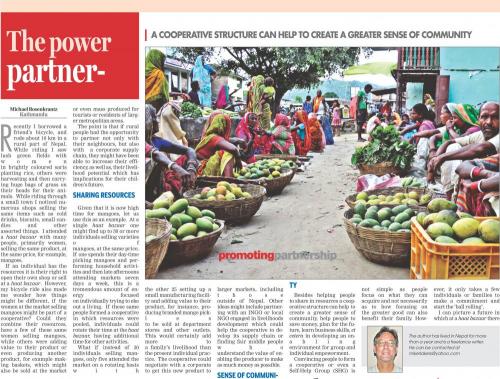
Recently I borrowed a friend’s bicycle, and rode about 10 km in a rural part of Nepal. While riding I saw lush green fields with women in brightly colored saris planting rice, others were harvesting and then carrying huge bags of grass on their heads for their animals. While riding through a small town I noticed numerous shops selling the same items such as cold drinks, biscuits, small candies and other assorted things. I attended a haat bazaar with many people, primarily women, selling the same product, at the same price, e.g. mangos.
If an individual has the resources it is their right to open their own shop or sell at a haat bazaar. However, my bicycle ride also made me wonder how things might be different, e.g. if the women at the market selling mangos might be part of a cooperative? Could they combine their resources, have a few of these same women selling mangos, while others were adding value to their product or even producing another product, e.g. making baskets, which might also be sold at the market or even mass produced for tourists or residents of larger metropolitan areas.
The point is that if rural people had the opportunity to partner not only with their neighbors, but also with a corporate supply chain they might be able to increase their efficiency, as well as, their livelihood potential which has implications for their children’s future.
Given that it is now high time for mangos, let’s use this as an example. At a single haat bazaar one might find up to 30 or more individuals selling varieties of mangos, at the same price. If one spends their daytime picking mangos and performing household activities and then late afternoons attending markets seven days/week, this is a tremendous amount of energy focused on individually trying to eke out a living. If these same people formed a cooperative in which resources were pooled, individuals could rotate their time at the haat bazaar, having additional time for other activities.
What if instead of 30 individuals selling mangos, only five attended the market on a rotating basis with the other 25 setting up a small manufacturing facility and adding value to their product, e.g. producing branded mango pickles to be sold at department stores and other outlets. This would certainly add more to a family’s livelihood then the present individual practice. The cooperative could negotiate with a corporate to get this new product to larger markets, including those outside of Nepal. Other ideas might include partnering with an INGO or local NGO engaged in livelihoods development which could help the cooperative to develop its supply chain or finding fair middle people who understand the value of enabling the producer to make as much money as possible.
Besides helping people to share in resources a cooperative structure can help to create a greater sense of community, help people to save money, plan for the future, learn business skills, etc. in developing an enabling environment for group and individual empowerment.
Convincing people of forming a cooperative or even a Self-Help Group (SHG) isn’t simple as people focus on what they can acquire and not necessarily as to how focusing on the greater good can also benefit their family. However, it only takes a few individuals or families to make a commitment and start the “ball rolling”.
I can picture a future in which at a haat bazaar there are only five individuals selling a large variety of mangos representing 30 or more families who are part of a cooperative. Next to the haat bazaar I see a small manufacturing facility in which there are many women and their family members producing mango pickles in beautiful jars with an enticing label. Other types of pickles, depending upon the season, as well as beautiful baskets are also being produced leading to a more secure future for our children.










Add new comment